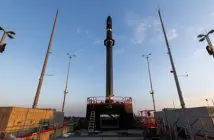
European imaging company Scanway Space has signed a contract with South Australian artificial intelligence company AICRAFT to deliver an edge computing module for integration into Scanway’s advanced space optical payload, which detects methane plumes.
Scanway Space is developing a dual optical payload to supply to South Korea’s NARA Space Technology as part of the NarSha project, South Korea’s first constellation of microsatellites for methane monitoring. AICRAFT’s edge computing module will be integrated directly into the advanced optical payload for processing visible, near-infrared and short-wave infrared data for methane plume detection directly on orbit.
AICRAFT designs and manufactures onboard computing systems with artificial intelligence and machine learning capability for big data applications. The edge computing device will be a tailored version of AICRAFT’s flagship data handling unit called Pulsar, featuring complementary high-speed interfaces for the particular imagers and NARA Space Technology’s satellite bus. In addition, AICRAFT’s precise cloud coverage estimation and fast compression algorithms will be used for optimal data downlink and more efficient customer service.
“We are extremely excited about our partnership with Scanway Space, and this project is the first outcome of our collaboration,” said AICRAFT CEO Dr Tony Scoleri. “We look forward to contributing to the climate change remediation in the Asia-Pacific region and globally.”
“Working with AICRAFT is enabling us to deliver a unique payload for the NarSha project with much flexibility to process many types of imagery data effectively,” said Scanway COO Mikolaj Podgorski. “We are excited to explore what can be achieved onboard the satellite that would help on Earth.”





